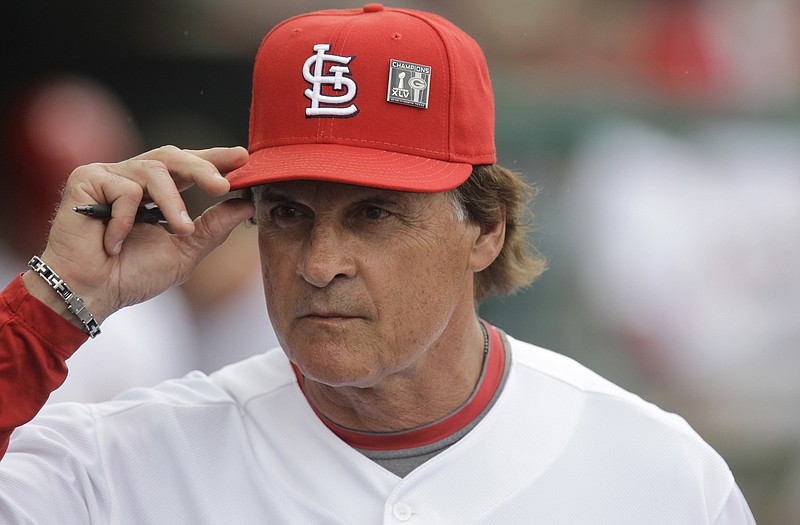ST. LOUIS (AP) - Tony La Russa noticed a change between his first game as a big-league manager in 1979 and his last in 2011.
"I was right at the beginning of guaranteed contracts. So right away, players had security, potential security, and they were motivated by, "Get yours. Get yours,'" he said.
"And then the media - ESPN started in September of "79'," he went on. "There was all kind of distractions. Fame and fortune. So what I really believed, and this is something we learned over time, leadership is more important than ever in professional sports."
After leading Oakland to the 1989 World Series title and St. Louis to a pair of championships in 2006 and "11, La Russa was unanimously elected Monday to baseball's Hall of Fame along with former managerial colleagues Bobby Cox and Joe Torre.
In the sabermetric age, La Russa was a bit of a throwback. He was part of the revolution of batter-pitcher matchups, creating the one-inning closer with Dennis Eckersley. But he was dismissive of a "Moneyball" culture valuing esoteric statistical data in favor of trusting what he saw.
"The metrics part of it is a really good preparation tool, but when you start replacing the manager, his decision-making, what you're doing is undercutting his opportunity to earn respect, and his leadership gets affected," he said. "Because who gets the credit for those decisions? That's 180 degrees the wrong place. So leadership is more important. The more than you can support your leader, which is the coaching staff and manager, the better chance you have to win."
Ever intense, the 69-year-old La Russa has spent the last two years as an adviser to baseball commissioner Bud Selig. La Russa would like to become a club executive.
"I miss the winning and losing," he said after his election was announced at the baseball winter meetings in Lake Buena Vista, Fla. "Some day I'll be with a team, I think. I'd like to be part of the competition again."
Even with a large lead, there was no let up in La Russa's dugout. Lips tightly pursed, he pondered the possibilities from his spot in the corner nearest the steps to the clubhouse.
An innovator, he batted his pitcher eighth in the batting order 432 times, ostensibly to set up a more favorable scenario for Albert Pujols.
Until La Russa made his final move, walking off from the 2011 World Series parade into retirement, the guard never really came down. And in some ways it still hasn't, as evidenced by fierce attachments to favorite players, general managers and owners.
Cerebral, and often combative and cranky, La Russa compiled a regular-season record of 2,728-2,365 in 33 seasons. He had 70 postseason victories, trailing only Torre's 84, and joined role model Sparky Anderson as the lone managers to win Series in both leagues.
In all, La Russa managed 12 first-place finishes and six pennants and was picked as Manager of the Year four times. He went to the World Series three straight years from 1988-90, and also lost in the Series in 2004 when the Cardinals were swept by Boston.
A career .199 hitter with no home runs, La Russa made his big-league debut as a teen infielder with the 1963 Kansas City Athletics. He got his first managing job at age 35 with the Chicago White Sox in 1979.
In 1983, La Russa guided the White Sox to their first postseason berth in 24 years. He rewarded new Cardinals owners with a division title his first season in St. Louis in 1996, ending the franchise's nine-year postseason slump, and made it to the playoffs nine times in 16 seasons overall.
The Oakland connection of La Russa and general manager Walt Jocketty led to a trade for Mark McGwire, who shattered Roger Maris' record of 61 homers that had stood since 1961 with 70 homers in 1998. Though since tarnished by McGwire's admission of steroid use, Big Mac was a one-man show that had fans clamoring to see him launch batting practice fastballs into the seats and helped regularly sell out Busch Stadium despite the team's so-so record.
La Russa consistently denied knowledge or involvement in the steroids scandal.
The manager's no-nonsense approach and refusal to relocate to the Midwest left a bit of distance from a fan base that adored Whitey Herzog's folksy approach. La Russa softened and gained perspective during the 2001 season, marred by the death of pitcher Darryl Kile.
The final season was trying. A painful bout of shingles sapped energy early in the season and he informed GM John Mozeliak of his decision in August before the Cardinals rallied from a 10½-game deficit in the NL wild-card race to upset Philadelphia and Milwaukee in the playoffs.
Down to their final strike in two different innings in Game 6, the Cardinals came back in Game 6 of the World Series against Texas and then won the title.

